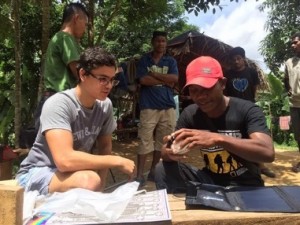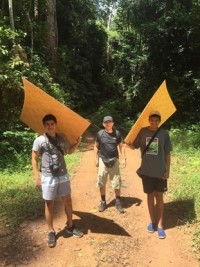Following in the Lewis & Clark tradition of environmental responsibility, Ary Hashim BA ’20 spent the past summer turning his dream of expanding Malaysian solar energy into reality with Project Kampung Ku. The project took hold after applying for a Renewable Energy Fee Fund.
The REFF provides grants to Lewis & Clark students from the surplus funding of the college’s voluntary Renewable Energy Fee. Students can apply for grants, once per year and up to three times during their Lewis & Clark tenure, with a proposed project or initiative that supports and promotes renewable energy. The projects are expected to benefit and support the educational mission of the students who support the fund.

Hashim was born and raised in Malaysia, and came to the United States as an undergraduate student at Lewis & Clark College. Although he was initially drawn to the strength of L&C’s economics department, Hashim’s appreciation for the environmentally friendly and beautiful campus cemented his decision to attend. “I got the offer in the mail and knew this was the place to be.”
Hashim believes the college’s environmental consciousness directly impacts its student population. “The passion and the enthusiasm are here,” Hashim says of environmental activism at Lewis & Clark, citing the work of recent graduate Valcourt Honore BA ’17 and senior Kori Groenveld BA ’18. “That’s what inspires me to do these things—I see something I’m intrigued by and then I want to then go out and do it myself.”

When Hashim received a REFF grant, the project began to take shape. Hashim’s uncle, an environmentalist, travelled to Kampung Dedari and conducted the preliminary fieldwork to pinpoint which services were most needed and where. “The locals have been deprived and their homes have been destroyed,” Hashim explains. “Their land is being encroached upon and used for development, but they’re trying to modernize at the same time. This project is meant to be the other side of that coin because we’re here to ask them what they need of us. It’s a symbiotic relationship.”
The information that came back to Hashim and his uncle echoed his time on Lankayan Island: the greatest need was light. Armed with a $4,500 REFF grant, Hashim traveled to Kampung Dedari in August for the five-day solar power installation process. Today, he receives a monthly assessment report on the health of the material and how it is being used.
For Hashim, environmental activism complements his prospective degree in economics. “It all comes down to economic development that looks into empowerment and breaking out of the poverty cycle, but with the environment at its forefront.”
The future of the project may not be decided as of yet, but the possibilities are endless.
This story was written by Scout Brobst ’20.
To find more Lewis & Clark college news, visit www.lclark.edu/news/
